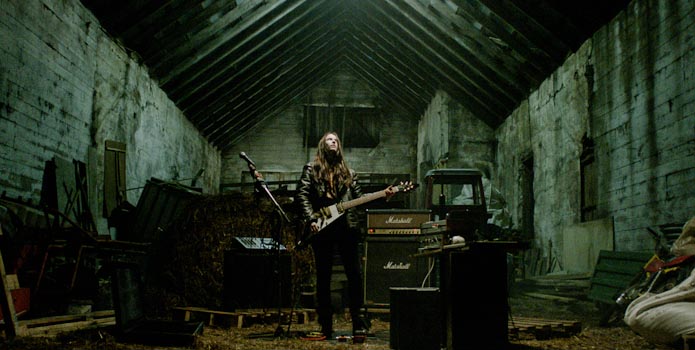Not for a single moment of it’s 1:38 runtime does Metalhead do what you think it will.

From the first moments when peace and pastoral beauty are shattered by a moment of shocking violence, a blooding scalp flapping around the exposed gears of a threshing machine, Metalhead never stops startling the audience. It is a story about healing, finding the core of one’s authentic self, and the power of community, scored by classic heavy metal and historically framed by the church burnings and violence of the black metal scene in the early ’90s.
A deeply emotionally, beautifully composed and narratively impressionistic film, the plot is built in increments, each moment stacking on top of the other to create a kind of story by accretion. Hera, at 12, watches her brother Baldur killed in a farm accident, after which every member of the family retreats from each other and flounders within their own specific prison of grief. Her father becomes silent and withdrawn; her mother is depressed and often catatonic, prone to moments of shock and flashbacks; and Hera completely loses herself in heavy metal, devoting her every waking moment to it. She too is frozen, trapped in her isolated community; she repeatedly sits at the bus stop, packed up and ready to head to “the city,” but never musters the courage to actually board.
Throughout the film’s narrative, obvious choices are constantly presented, but each passed over for the more real, true, chaotic, authentic. The audience is often left waiting for an expected plot beat to manifest, only to find something else in its place, and every unexpected choice is invariably better, lovelier, more deep. There are multiple moments when it seems that the community with invariably turn on Hera for the wildness of her behaviour, her lashing out, and her musical devotion — especially considered the fevered fear of black metal brewing in Scandinavia in the wake of church burnings and eventual murders. Hera’s quest ultimately becomes not to extinguish the fire of her grief and passion (though she does try that too), but to finally direct that energy in the right way
Healing, whether for Hera, her parents, or any other character presented in the film, is never a straightforward and easy process. No one gets better steadily; rather, it is a series of stops and starts, clawing forward and relapsing, punctuated by furious breakdowns and moments of quiet bliss. The narrative unfolds everyone haltingly lurches towards a healthier place in their own way, emphasizing the non-linear structure’s beautiful angularity.
Hera is a deeply wounded, unpredictable, and complex character, and her writhing progress towards some kind of self-actualization and self-expression is endlessly painful and captivating to watch. Thorbjörg Helga Dýrfjörd portrays her as both profoundly vulnerable and intensely strong, often in the same moment, like when she tries to mosh at her small-town dance to express some aggressive energy. He behaviour swings from the sweet to the erratic, and Bragason presents her as the kind of character that doesn’t need to be entirely forgiven or understood to be deeply sympathetic. The audience is invited to get to know her closely, and at that level of intimacy forgiveness becomes easy.
The music is, of course, and incredibly important part of the story as well, serving both as Hera’s escape and her crutch, the way that she drives people aways and shields herself, but also, ultimately, the way she comes to express, cleanse, and heal. She expresses affection by making people mix tapes, grieves for and remains close to her brother by learning is favourite sings and playing that at his gravesite, an ultimately begins to write and record music of her own inspired by the burgeoning black metal scene, her great metal loves (Venom, Celtic Frost, Iron Maiden, Judas Priest, Scorpions), and her own experience of all-consuming grief.
At a moment when the cleansing properties of heavy metal are beginning to make deadlines, rather than negative and fearful propaganda, Metalhead speaks deeply to this kind of musical catharsis. Never simple or clean, is nonetheless finds a kind of clarity, and inner point of piece as the chaotic and noisy grieving of the characters plays out. It is also a gorgeous and nuanced exploration of the depths of fandom, the way a relationship to a specific type of art can come to define us.
